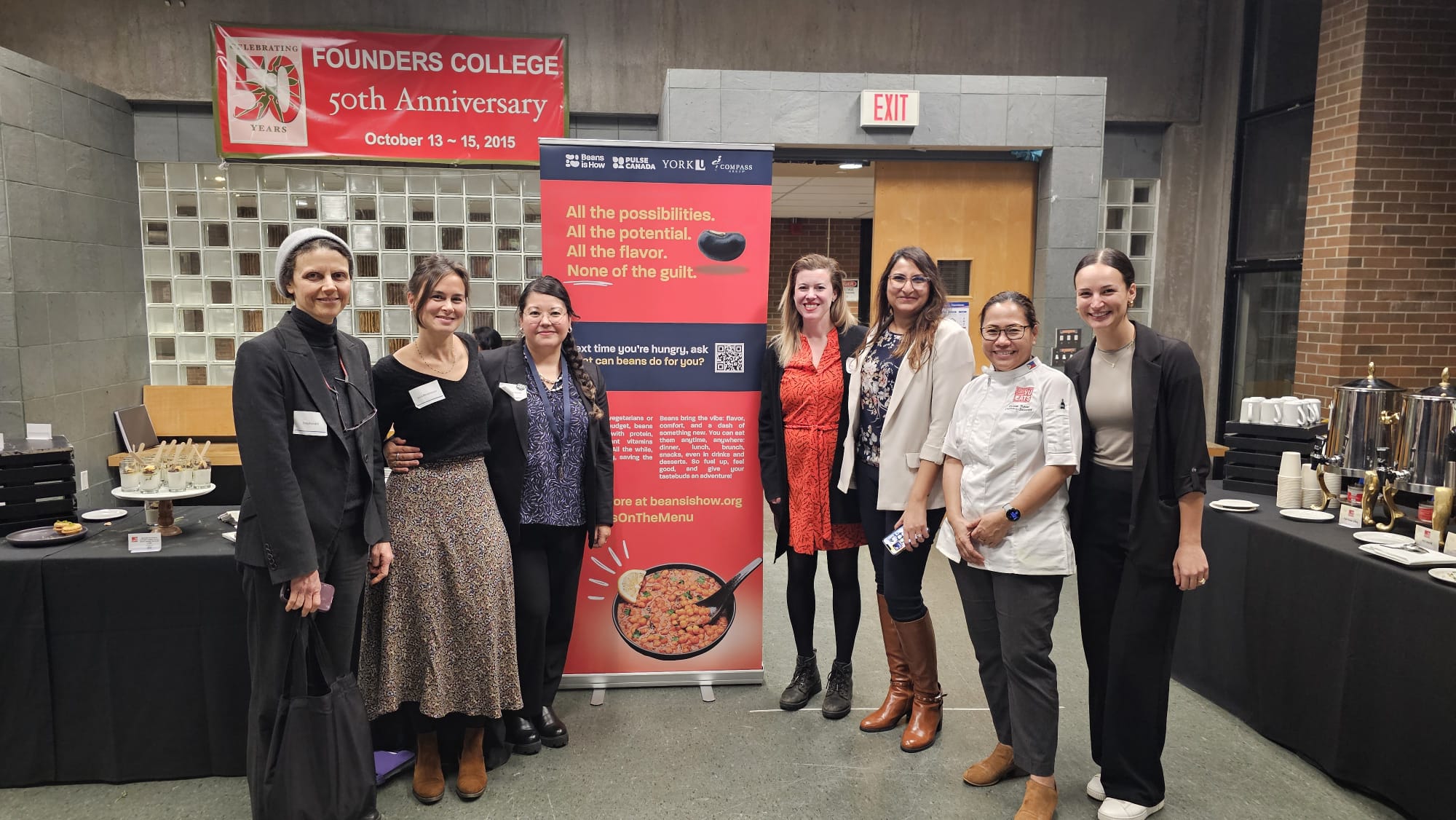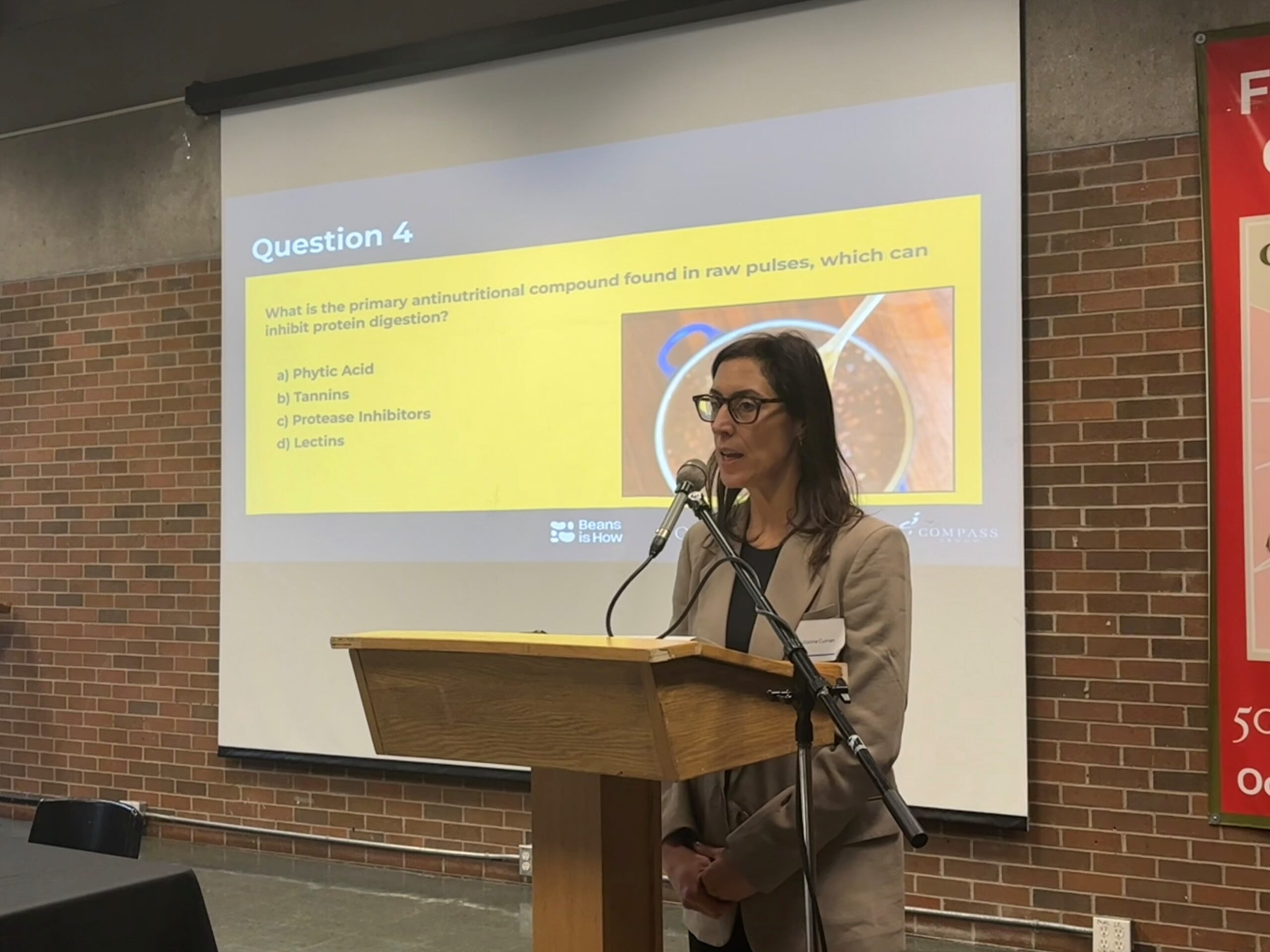A Catalyst for Change in Canada’s Food Landscape

On November 19, 2024, Pulse Canada, Beans is How, York University and Compass Group Canada co-hosted “All About Beans Summit: Inspiring More #BeansOnTheMenu in Canada”. Hosted at York University in Toronto, it gathered food system leaders, chefs, academics, and advocates from across Canada to highlight the transformative potential of beans in tackling pressing challenges such as food insecurity, climate change, and diet-related health and nutrition illnesses. This landmark summit was not just about conversations but about building actionable plans to get more Canadian-grown beans onto plates. Here’s a deep dive into what made the event so impactful and what lies ahead for the bean movement in Canada.
Why Beans Matter in Canada’s Food Landscape
The Summit kicked off with a land acknowledgment and welcome remarks led by Dahlia Abou El Hassan of York University, followed by a bean trivia game to introduce some interesting facts about beans and other pulses.
Julianne Curran of Pulse Canada provided an excellent overview of the pulse market in Canada. Canada is one of the world’s largest producers of pulses, including peas, lentils, fava beans, and dry beans. Despite this, domestic consumption of beans has seen a decline in traditional settings like retail purchasing and home meals, even as demand grows for snacks and plant-based options in schools and workplaces. Most of these are grown in the southern regions of Alberta, Manitoba, and Quebec, with 80% exported globally.
The Summit underscored the urgent need to reverse this trend. With the rising cost of living, two million Canadians now rely on food banks every month—a figure that has doubled in just five years. Beans emerged as a powerful tool to address food insecurity, offering an affordable, nutritious, and versatile meal choice. Their low environmental impact compared to meat and dairy also makes them a climate-friendly choice.

Important Context-Setting Panel Discussions
- Food Security for the most vulnerable: Lisa Wernham of Food Banks Canada and Debbie Field of the Coalition for Healthy School Food emphasized the role of beans in improving access to nutritious food. Food banks across Canada are already incorporating more pulses into their offerings, and the 2024 government commitment to a $5 billion national school meals program provides an exciting opportunity to feature beans as a staple ingredient. Meanwhile, Dr. Mary La’Abbé, University of Toronto stressed the need to promote adherence to Canada’s Food Guide, which advises more whole food plants in diets (not just alternative plant-based products), and Nicole Bamber additionally provided evidence of how beans emit lower greenhouse gas emissions compared to animal proteins, making the case for their inclusion in climate-focused policies. The panel was hosted by Mike Layton, Chief Sustainability Officer, York University..
- Cultural and culinary appeal: The Chef panel, hosted by Karli Nummikoski, Compass Group Canada, showcased creative ways to make beans desirable and trendy. Chef Dennis Prescott, a Canadian TV host and cookbook author, championed the idea of “delicious-led storytelling” to reshape beans’ reputation. Recipes like Navy Beans à la Vodka and Lentil Tourtière exemplified how beans can be both comforting and innovative. Donna Tobias and Rick Powless, both of York University highlighted the cultural significance of beans in Indigenous and global cuisines, and stressed the value of experiential moments, such as cooking classes and taste testing, while sharing dishes that bridge tradition and modernity.

- Creating an enabling environment through a multi-leveled sectoral approach Beans represent an economic and environmental opportunity for Canada. This panel, hosted by Riana Topan, explored the trends across sectors:
- Chris Mariangelli noted that the value proposition and customers’ purchasing considerations center around price and affordability, taste, health-implications, convenience, and lastly sustainability.
- Jo-Ann Marshall emphasized that the emergence of TikTok is encouraging a return to intuitive cooking, alongside cultural exploration, and how we need to promote tasty, and easy ways to cook beans.
- Jeff English echoed these sentiments, suggesting we consider how to promote how beans and pulses can be easily incorporated into diets for different lifestyles while also educating about their benefits and supporting local farmers.
- Brad Grabham of Hensall Co-Op shared how Canadian farmers prioritize sustainability, leaving the land better for future generations. Farmers are eager to expand production but need increased domestic demand. Suggested we also tell the farmers’ story.
- Dahlia Abou El Hassan provided a case study on University of York’s plant-forward approach, which included signing two pledges to improve food sustainability, pricing plant based dishes as more affordable on the menu and making them the first two options in the choice architecture, and leveraging culturally diverse foods.
Great ideas from the Working Groups
The Summit offered several actionable insights to increase bean consumption in Canada:
- Foster Cross-Sector Collaboration: Collaboration between food producers, marketers, chefs, and policymakers is essential to drive change, as is breaking down silos to find new allies. A virtual summit will invite Canadian stakeholders to further connect and collaborate in early 2025.
- Integrate Beans into National Policies: Beans are an affordable and nutritious solution to address food insecurity, a leading concern with levels rising rapidly across Canada. Operationalizing the Canadian Food Guide and aligning with the national school meals and other plant-forward programs can make beans more visible and accessible.
- Lead with Flavor and Tell a Great Story: TikTok campaigns, cooking classes and chef collaborations can help reshape perceptions, making beans trendy & delicious There’s a lot of power in experiential, including cooking classes, taste testing, and intergenerational activities. It’s important to recognize the role of culture and indigenous knowledge, and to bridge gaps between growers and consumers.
- Break Down Barriers: We need to develop easy guides and partnerships with food service, retail and other sectors that address misconceptions about beans, and enhance their reputation as convenient, affordable, and easy to prepare.
Join the Movement!
The Toronto Summit was more than an event—it was a call to action. Beans are not just a solution to Canada’s food challenges; they are a symbol of hope, sustainability, and innovation. As we work to make #BeansOnTheMenu the norm in Canadian homes, schools, and restaurants, we invite you to be part of this exciting journey.
Beans is How is a global campaign to double bean consumption by 2028, addressing challenges like hunger, malnutrition, climate change, and food affordability. Backed by nearly 100 organizations, it uses a positive, inclusive approach to make beans more visible, accessible, and desirable through initiatives like #BeansOnTheMenu, chef collaborations, and policy advocacy.
#BeansOnTheMenu at the All About Beans Summit







